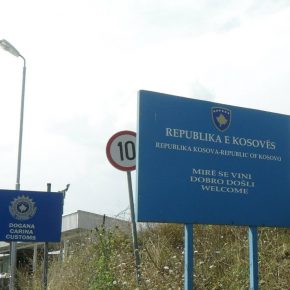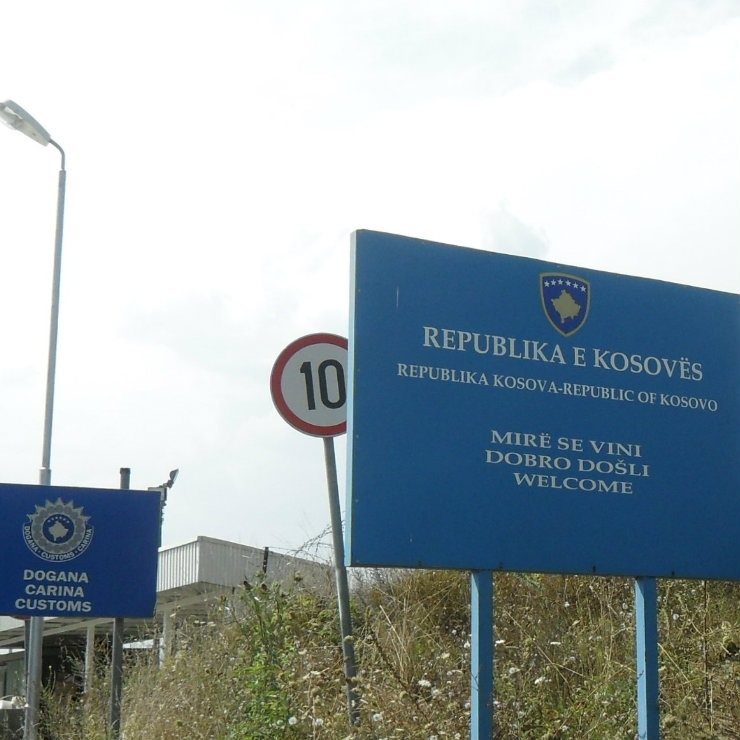
Border between Kosovo and Serbia (Krzysztof Dudzik, CC BY-SA)
Arbitration has been abandoned because the United Nations Mission in Kosovo (UNMIK), who acts on behalf of the Repuplic of Kosovo within the CEFTA Agreement, declared itself unqualified in this matter. Kosovo became a full member of Central European Free Trade Agreement (CEFTA) in July 2007, and the Memorandum of Understanding was signed by UNMIK on behalf of the Priština institutions. On the other hand, since Kosovo became a member of CEFTA, it took over from UNMIK a part of the responsibility for this agreement, and the authorities in Priština even submitted a request to the European Union that UNMIK no longer presents Kosovo in CEFTA.
Due to the 100 per cent tax imposed on Serbian products on November last year, Serbia suffered up to EUR150m by the end of April. According to the Serbian government data, on a daily basis, about EUR1m are lost. One of the counteractions of Belgrade to Priština could be to stop their trucks with goods going to the European Union. In that case, however, there would be a risk that Serbia would also be accused of violating the Stabilization and Association Agreement with the EU, which is a step back in the country’s accession hopes.
The tariffs introduced by Kosovo had the aim to strengthen domestic production. The decision came after the proposal of the Minister of Trade and Industry, together with a call on domestic producers to focus on quality, and traders to explore new markets for co-operation. The Kosovo government reminded that domestic producers face many barriers in Serbia and that their products would not sold in the Serbian market. Also, the Government obliged the Ministry of Trade and Industry and all relevant institutions to abolish and stop the potential import of all products that are not related to and contradict “the official and constitutional name of the Republic of Kosovo.” CEFTA responded saying that this unilateral move not only constitutes a serious infringement of the CEFTA, it comes as a serious blow to cooperation, good neighborly relations and reconciliation in the region.
The import from Serbia within five months from the introduction of the tariffs decreased by 88 per cent, or some EUR160m. Imports from Bosnia and Herzegovina (BiH) fell by 83 per cent or EUR24m. The biggest profits in this period were achieved by Slovenia, Israel and Turkey, which had a huge growth of exports to Kosovo. Despite falling imports from Serbia and BiH, Kosovo’s trade deficit is on the increase. The introduction of 100 per cent tax on products from Serbia and BiH did not bring any benefit to Kosovo, and there was no economic growth in Kosovo during this time.
The introduction of this tax is not well-conceived because there was no preliminary analysis of the effects. The data do not show an accelerated growth of the processing industry in Kosovo, either in terms of production volume or new jobs creation. Kosovo did not see any benefits from introducing 100 per cent tax, and now many analysists think that Kosovo should seek to re-negotiate the CEFTA agreement.
The total imports continued to grow. It’s probable that products from BiH and Serbia continue to enter Kosovo through other countries in the region. Economic research in Kosovo shown that 100 per cent tax has not bring any effects on exports. What is noted is the increase in the prices of domestic products. Some of the reasons for price increases are the reduction of competition in certain products, the increase in raw material costs for domestic firms, the increase in transport costs and the price of imported products. The main beneficiaries are countries that have increased imports of their products in Kosovo: Slovenia, Israel, Albania and Turkey. Maintaining taxes for a longer period could have an impact on increasing poverty in Kosovo due to rising prices.
But the Kosovo authorities do not see the situation in this way. Priština institutions praised the data that “even the biggest optimists could not even imagine”. Apparently, the introduction of 100 per cent of the increased taxes overrepresented the trade with Belgrade. Furthermore, the Prime Minister Ramush Haradinaj’s advisors say the imposed increased taxes on goods from Serbia and BiH brought economic and political benefits to Priština. That is why they do not plan to lift the taxes until Serbia does not meet the conditions that the Kosovo government has asked for.
Still, the EU is very clear in its oppositions to the Kosovo’s measures. The EU officials and their ambassadors in Kosovo warn that the tax policies are major block for the continuation of negotiations between Belgrade and Priština, as well as the clear violation of the CEFTA agreement. The agreement with Serbia should enable Kosovo’s full international integration, including UN membership. During a previous Berlin summit, the meeting concerning the political and economic fate of the non-EU Balkan states, France and Germany have shown their willingness to facilitate the continuation of the dialogue between Belgrade and Priština, but to do so, it is necessary to have a serious commitment on both sides.
It seems that Kosovo is not only damaging the free trade agreements because of the political relations with Serbia and BiH, but also with the neighboring Albania. The authorities in Priština announced that they would be able to introduce a 100 per cent tax on products from Albania in two months if Tirana does not remove obstacles to the export of Kosovo flour, beer and potatoes. This kind of development took place after an unsuccessful meeting between representatives of Tirana and Priština on which two sides failed to agree on ways in which the three Kosovo products could be efficiently exported to Albania. Essentially, the problem in the trade relations between Tirana and Priština arises as Kosovo authorities removed all barriers to Albanian exports to Kosovo, but the authorities in Albania have not yet fulfilled their part of the agreement. Kosovo authorities argue that barriers to export goods to Albania are almost identical to those exported to Serbia, and the government of Edi Rama has issued an ultimatum to remove all obstacles or face high taxes in two months. Kosovo, along with Italy, is a key Albanian trading partner. Albanian Prime Minister even urged his Kosovo counterpart to put an end on the damaging tariffs policies at the meeting in Berlin. A relative optimism is given to the fact that Haradinaj’s steadfastness is due to the 2020 elections in Kosovo. This is the way to raise his political rating after which he might be more open to the changes economic policies.
There are numerous reports and statements that the goods of Serbian producers are still on the shelves of Kosovo stores, and they come there either by re-export through third countries, Macedonia, Croatia and Montenegro, or through smuggling. This was stated in beginning of May by the President of Kosovo Hashim Thaçi, and Serbian Minister of Trade Rasim Ljajić. About EUR440m worth of goods were delivered to Kosovo last year.
In March this year, Kosovo’s trade deficit with the world amounted to EUR260m, and in the same month last year EUR229m. Now Kosovo has lower imports and trade deficit with CEFTA countries. From the point of view of the countermeasures, however, it is more important to have exports from Kosovo to Serbia. Serbia is its fourth export market with a share of about 5 per cent, but it is only about EUR20m a year. Experts agree that the reciprocal measures such as introducing tariffs on goods from Kosovo would not bring a wanted effect. Only a termination of negotiations would be a serious step. This puts pressure on the EU and the United States, as well as neighboring countries, to reduce or condition support for Kosovo. However, as this pressure was unsuccessful, at least until now, so the Serbian authorities feel obliged to directly pressure the Kosovo authorities.
But reciprocal customs cannot have the same consequences as Kosovo’s customs duties on imports of Serbia, because Kosovo exports to Serbia are practically negligible from the point of view of Kosovo’s economy as a whole, while this is not the case with Serbia. Simply put, for Serbia and economic and political ties with Kosovo are more important than for Kosovo are ties with Serbia, and this asymmetry determines more or less everything. The question remains of the transit of goods and people from Kosovo through Serbia to other customs areas. This would be the only thing that can be done, but when there is such a disproportionate trade, Serbia does not have a large maneuvering space.
Vedran Obućina is an analyst and a journalist specializing in the Croatian and Middle East domestic and foreign affairs. He is the Secretary of the Society for Mediterranean Studies at the University of Rijeka and a Foreign Affairs Analyst at The Atlantic Post.


